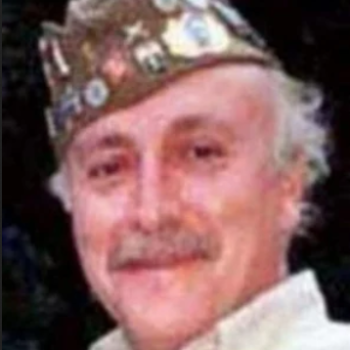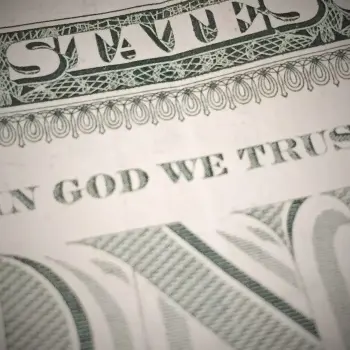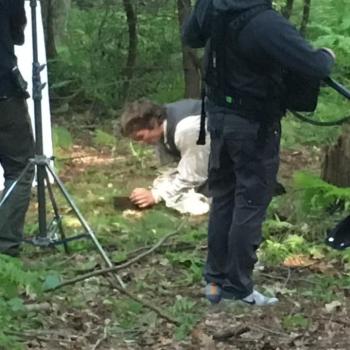Editors' Note: This article is part of the Patheos Public Square on Faith and Reason. Read other perspectives here.
In the utter darkness of my father's basement darkroom, while he developed images on film of wedding parties, I developed a childhood epistemology. When my dad said to shut off the lights and I pulled the string, did the room and the things around me stay put, or scamper around repairing shoes like the elves did in my favorite story, or did everything melt away into nothingness like in my nightmare? I would experiment with the lights, pulling the string over and over, quickly enough, I hoped, to catch things rushing back to their places. I yearned to catch them — and dreaded it.
Believing in invisible things is important. Babies convince themselves of the permanence of objects, like toys and mothers that constantly appear and disappear, and they look for them. By the time I was old enough to stand in the darkness with my father, speculating about the secret life of the furnishings was more a game than a serious doubt that Reality was reliable. I mostly believed.
I loved to stand there with my dad, listening to the rattle and slosh of his hardware and chemicals, smelling their distinct sequential smells, hugging the cool steel post supporting the house above us, and picturing his blind hands as they summoned from it all his pictures of strangers, first on long strips of plastic rolled up in cans, then on big pieces of wet paper.
We talked. I interrogated him about photography, about the war, about his childhood. His stories and explanations in that intimate darkness shaped me. But we were silent for long stretches, too. His company made that darkness safe.
It felt good when things seemed to line up, the world fitting like fine joinery. When they didn't, or when the grown-ups' stories revealed discrepancies, I assumed I needed more information to make sense of the world. Like most projects of childhood, this one was difficult: to reconcile the accumulating news I received from sensory experience, the wisdom I received from my parents and Sunday-School teachers, and the intimations of my heart.
Now I teach kindergarten. I've listened to children reason about things that are invisible. I've learned to respect their intelligence and longing when they wrestle with weighty questions — "Is Santa Claus Real?" for example.
I hope you won't feel this example trivializes faith. My students discussed the question in deadly earnest. We practiced having discussions on many topics. Picture them sitting in a circle and me transcribing. Note their reasonable arguments in this excerpt, invoking empirical evidence and authoritative sources, all informed — or biased — by their wishes.
Clayton: I think Santa's real because how could there be presents all over the world? For children.
Abbie: I think that the parents just get the presents and leave them by the tree when you're asleep or something.
Sawyer: I think that Santa's not real because I think he's just dressed up, he's just a plain old man. I think when I went to the parade of lights I think I saw him. Yeah, I did see him. And I think it might have been one of his elves, I don't know.
Samantha: I think that Santa is real because I saw him at the parade of lights and I think that Santa is real because how would we even get presents without Santa?
Izzy: I agree with Samantha because I've really seen him before at my dad's office.
Emery: I agree with Samantha and Izzy because I've seen Santa at the mall.
Miles: I agree with Devon because I've had a picture with Santa and I get snow globes every year from him when I go to see him.
Julia L.: I agree with Emery because I have seen Santa at nighttime when I was going downstairs I got to see him.
Abbie: I disagree with Julia L. because you can't wake up that early in the night, well it's not very early, it's late, because Santa isn't real and I think there's a dressed up man in every house that goes like Santa and walks to our houses.
Nghia: He goes through the chimney because he is a magical person. When he comes down he can go back up.
Miles: I disagree with Nghia because I've seen Santa Claus 1 the movie and it's actually the bag and the bag brings him down and the bag makes him skinny 'cause he's fat and if he stays fat he won't be able to go back up or down. He'll just be stuck.
Samantha: I disagree with Miles because I think he is kind of big. I think he just goes through the doors of the houses because he's magic. He can be faster than you can blink. I think he can open the door without a key.
 |




